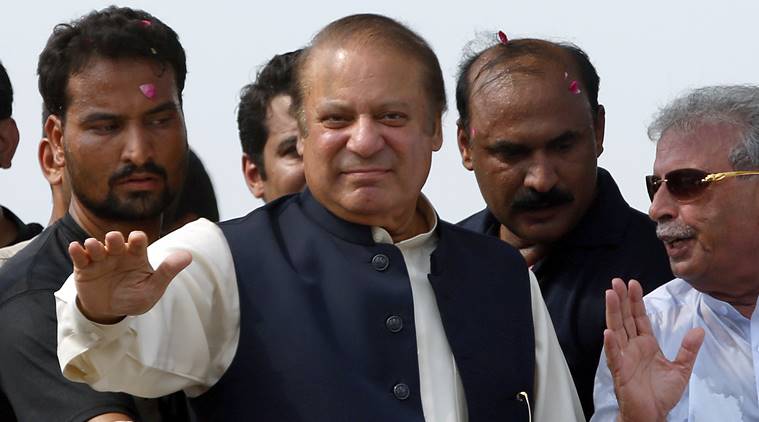 An anti-corruption court on Friday convicted ousted prime minister Nawaz Sharif in the Avenfield case. (File)
An anti-corruption court on Friday convicted ousted prime minister Nawaz Sharif in the Avenfield case. (File)
In a jolt to the Pakistan Muslim League-Nawaz (PML-N) party just days ahead of the general elections, an anti-corruption court on Friday convicted ousted prime minister Nawaz Sharif in the Avenfield case and handed a 10-year jail term, virtually bringing down curtains on his four-decade-old political career.
The Avenfield case ─ which pertains to the purchase of four flats in Avenfield House, Park Lane, London ─ was among the three cases filed by the National Accountability Bureau (NAB) against the former premier and his children on the Supreme Court’s orders in July 28 Panamagate verdict that disqualified Sharif.
Moreover, the court handed Sharif’s daughter Maryam Nawaz 7 years prison sentence for abetment in the purchase of the properties in London and one year for non-cooperation in the case. Son-in-law Captain Safdar has been given one year jail time.
Here are some of the highlights of Sharif’s career:
* 1949 – Nawaz Sharif is born into a Kashmiri family of industrialists in the eastern city of Lahore. He later graduates with a law degree from Punjab University and goes to work in the family steel business
* 1976 – Enters politics, joining the Pakistan Muslim League (PML) after the Sharif family steel business was nationalised under the government of Zulfiqar Ali Bhutto, the beginning of a long political rivalry between the families.
* 1981 – Joins the Punjab provincial cabinet as finance minister, becoming Punjab’s chief minister in 1985. The PML later split and Nawaz formed the Pakistan Muslim League-Nawaz (PML-N).
* 1990 – First elected prime minister.
* 1993 – Removed as prime minister by Pakistan’s president. He is reinstated by Supreme Court but then resigns under pressure and his party loses elections to the Pakistan People’s Party of Benazir Bhutto, daughter of Zulfiqar Bhutto.
* 1997- Elected prime minister for second time. During his term, Pakistan successfully tests nuclear weapons in response to regional rival India’s atomic programme.
* 1999 – Overthrown in a military coup by General Pervez Musharraf, the country’s fourth army takeover since independence in 1947. After the coup, he was convicted of corruption and given a life sentence for hijacking over an incident when he ordered Musharraf’s plane not to land in Islamabad.
* 2000-2007 – Allowed to go into exile in Saudi Arabia in 2000 amid reports of a deal with the military, he was given a presidential pardon the day his family left.
* 2007 – Returns from exile to contest elections the next year as part of a political deal that ended Musharraf’s military rule.
* 2008 – Loses election to the party of Benazir Bhutto, who was assassinated ahead of the polls.
* 2013 – Elected prime minister for the third time. The PML-N sweeps back to power in an election the gives its allies a solid National Assembly majority.
* April 4, 2016 – The leaked Panama Papers show the involvement of Sharif’s family in offshore companies including two used to buy luxury homes in London.
* October 28, 2016 – Cricketer-turned-politician Imran Khan threatens to paralyse the capital, Islamabad, with a “lockdown” of street protests unless demands for an independent investigation into the Panama revelations are met. Sharif denies any wrongdoing.
* November 2, 2016 – Supreme Court agrees to set up a judicial commission to probe corruption allegations against Sharif, stemming from Panama Papers leaks. Khan backs down from lockdown threat.
* July 28, 2017 – Supreme Court declares Sharif disqualified from office for not declaring income from a company in United Arab Emirates, which was not in original Panama Papers revelations. The court also orders the National Accountability Bureau (NAB) to open a criminal trial into ownership of the London flats along with several other Panama Papers revelations.
* October 20, 2017 – Nawaz Sharif indicted in another corruption case relating to a Dubai-based company. Sharif did not disclose his income before tax authorities in Capital FZE, the accountability court ruled.
* April 13, 2018 – The Supreme Court further rules Sharif is banned from political office for life.
* July 6, 2018 – The NAB court convicts Sharif of corruption and sentences him in absentia to 10 years in prison.
(With Reuters inputs)